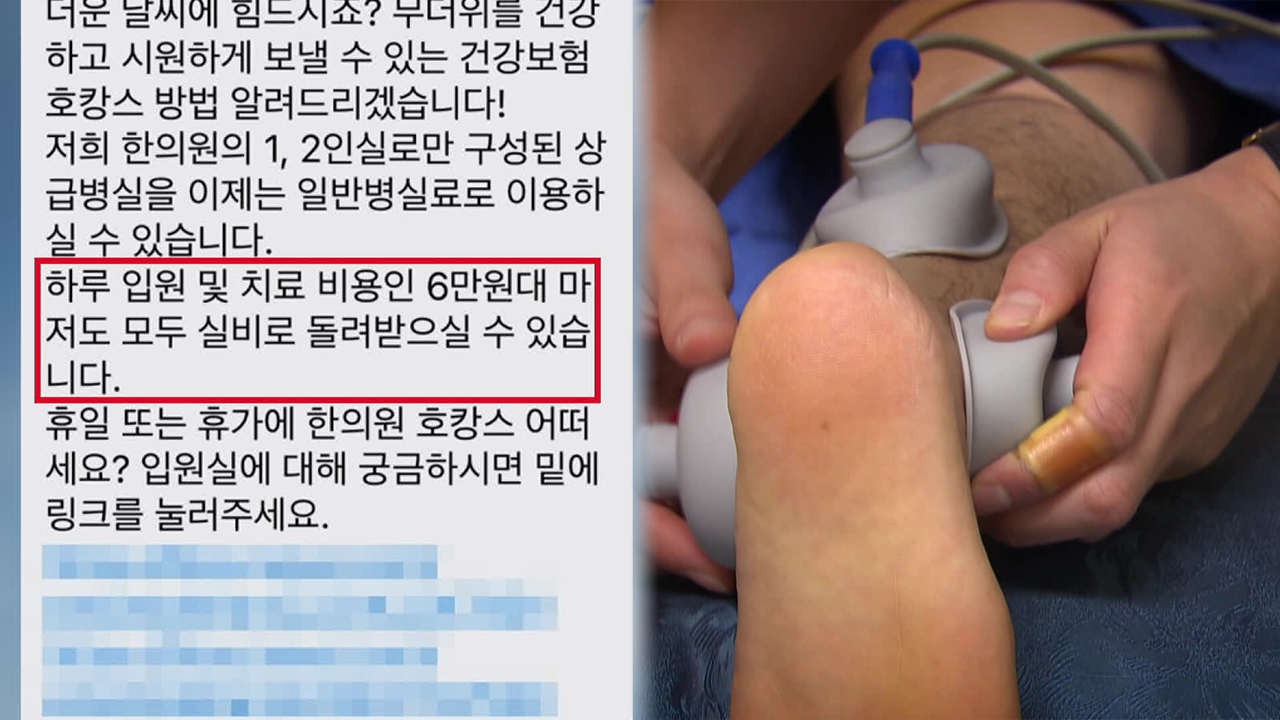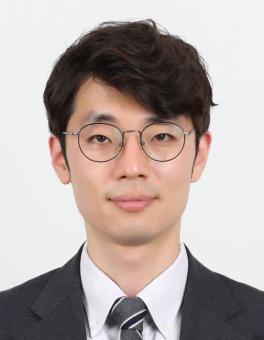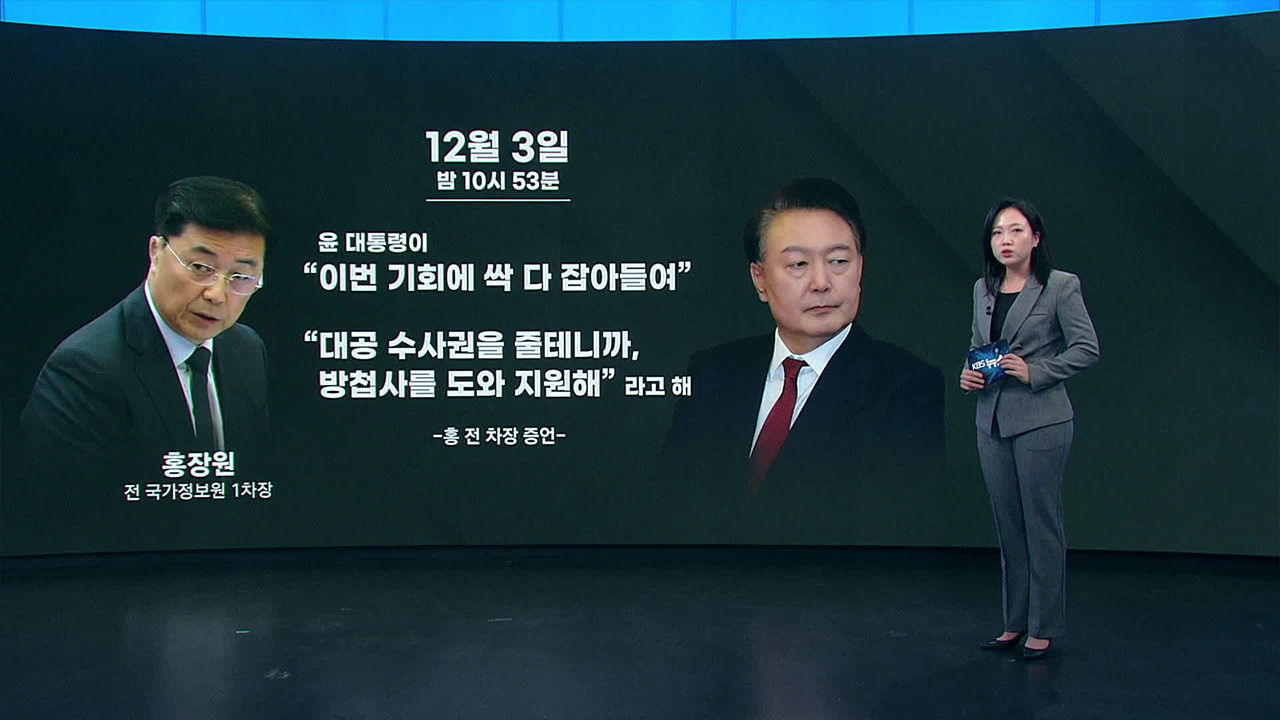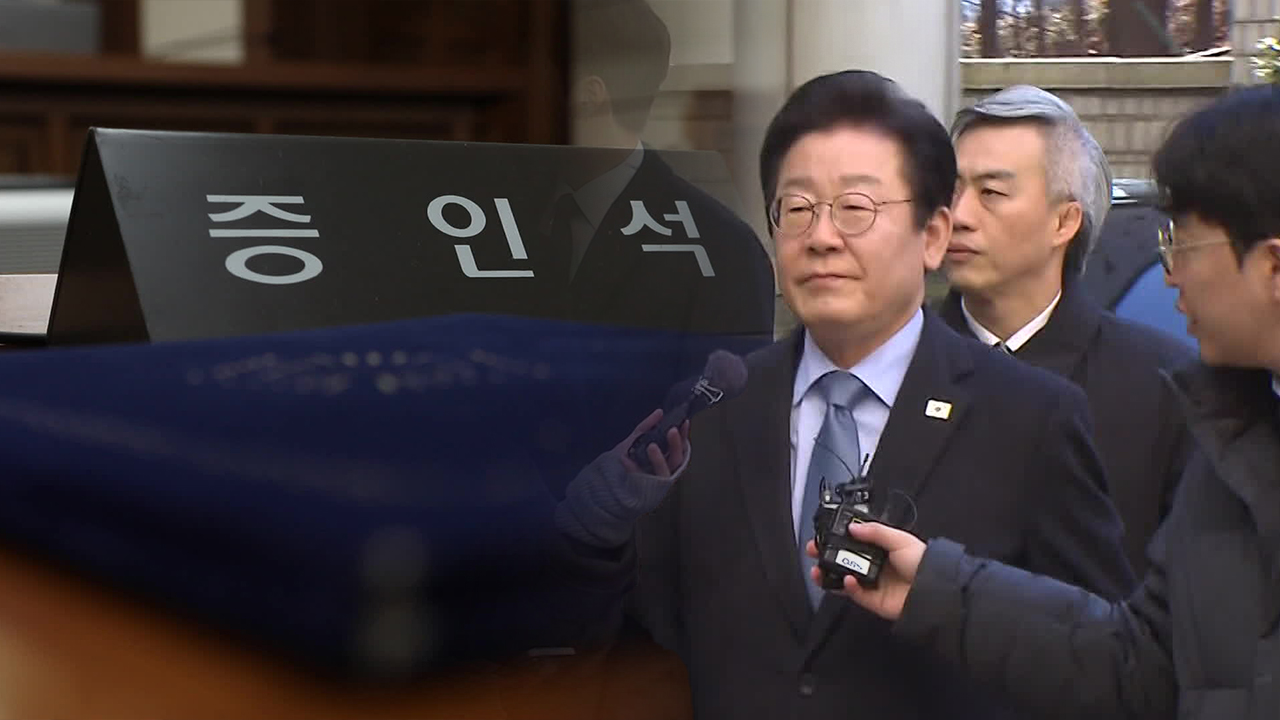[Anchor]
Measures are being pursued to establish criteria that prevent subscribers of health insurance from receiving unlimited physical therapy and to increase their cost burden.
This is one of the measures aimed at preventing hospitals from abusing treatments and providing excessive medical care to insurance subscribers.
Reporter Hong Seong-hee has the story.
[Report]
This is an advertisement text message sent by a traditional Korean medicine clinic in Seoul.
It claims that hospitalization and treatment costs can be reimbursed through health insurance, even using the term 'traditional Korean medicine staycation.'
[Mr. A/Health Insurance Subscriber: "(At the hospital) they said since it's first-generation (health) insurance, all physical therapy can be reimbursed."]
[Mr. B/Health Insurance Subscriber/Voice Altered: "The people giving consultations say that, but ultimately, it starts under the assumption that it will be covered by insurance."]
Excessive medical treatments primarily occur in non-covered medical services, such as physical therapy and nutritional injections, which are not reimbursed by public health insurance.
Such excessive medical care has been criticized for raising insurance premiums and causing doctors to flock to lucrative fields like orthopedics and dermatology, thereby weakening essential medical services.
In response, the government has decided to designate some non-covered medical services as 'managed benefits', set prices, and increase the patient burden rate from 90% to 95%.
It will also establish treatment standards, including limits on the number of procedures, to prevent misuse.
[Seo Nam-kyu/Director of Non-Covered Medical Services at the National Health Insurance Service: "There are noticeable items with large variations in medical costs, treatment volumes, and price increases that suddenly rise."]
Health insurance will also be restructured to reduce benefits for non-severe and non-covered medical services.
For general patients, the final out-of-pocket cost for outpatient treatment may increase by up to 36%, while the coverage level for severe patients will be maintained.
Some insurance consumer groups and medical associations are opposing this government reform plan, citing reasons such as reduced benefits for insurance subscribers and decreased hospital revenues.
This is KBS News, Hong Seong-hee.
Measures are being pursued to establish criteria that prevent subscribers of health insurance from receiving unlimited physical therapy and to increase their cost burden.
This is one of the measures aimed at preventing hospitals from abusing treatments and providing excessive medical care to insurance subscribers.
Reporter Hong Seong-hee has the story.
[Report]
This is an advertisement text message sent by a traditional Korean medicine clinic in Seoul.
It claims that hospitalization and treatment costs can be reimbursed through health insurance, even using the term 'traditional Korean medicine staycation.'
[Mr. A/Health Insurance Subscriber: "(At the hospital) they said since it's first-generation (health) insurance, all physical therapy can be reimbursed."]
[Mr. B/Health Insurance Subscriber/Voice Altered: "The people giving consultations say that, but ultimately, it starts under the assumption that it will be covered by insurance."]
Excessive medical treatments primarily occur in non-covered medical services, such as physical therapy and nutritional injections, which are not reimbursed by public health insurance.
Such excessive medical care has been criticized for raising insurance premiums and causing doctors to flock to lucrative fields like orthopedics and dermatology, thereby weakening essential medical services.
In response, the government has decided to designate some non-covered medical services as 'managed benefits', set prices, and increase the patient burden rate from 90% to 95%.
It will also establish treatment standards, including limits on the number of procedures, to prevent misuse.
[Seo Nam-kyu/Director of Non-Covered Medical Services at the National Health Insurance Service: "There are noticeable items with large variations in medical costs, treatment volumes, and price increases that suddenly rise."]
Health insurance will also be restructured to reduce benefits for non-severe and non-covered medical services.
For general patients, the final out-of-pocket cost for outpatient treatment may increase by up to 36%, while the coverage level for severe patients will be maintained.
Some insurance consumer groups and medical associations are opposing this government reform plan, citing reasons such as reduced benefits for insurance subscribers and decreased hospital revenues.
This is KBS News, Hong Seong-hee.
■ 제보하기
▷ 카카오톡 : 'KBS제보' 검색, 채널 추가
▷ 전화 : 02-781-1234, 4444
▷ 이메일 : kbs1234@kbs.co.kr
▷ 유튜브, 네이버, 카카오에서도 KBS뉴스를 구독해주세요!
- Excess insurance claims curbed
-
- 입력 2025-01-09 23:54:40

[Anchor]
Measures are being pursued to establish criteria that prevent subscribers of health insurance from receiving unlimited physical therapy and to increase their cost burden.
This is one of the measures aimed at preventing hospitals from abusing treatments and providing excessive medical care to insurance subscribers.
Reporter Hong Seong-hee has the story.
[Report]
This is an advertisement text message sent by a traditional Korean medicine clinic in Seoul.
It claims that hospitalization and treatment costs can be reimbursed through health insurance, even using the term 'traditional Korean medicine staycation.'
[Mr. A/Health Insurance Subscriber: "(At the hospital) they said since it's first-generation (health) insurance, all physical therapy can be reimbursed."]
[Mr. B/Health Insurance Subscriber/Voice Altered: "The people giving consultations say that, but ultimately, it starts under the assumption that it will be covered by insurance."]
Excessive medical treatments primarily occur in non-covered medical services, such as physical therapy and nutritional injections, which are not reimbursed by public health insurance.
Such excessive medical care has been criticized for raising insurance premiums and causing doctors to flock to lucrative fields like orthopedics and dermatology, thereby weakening essential medical services.
In response, the government has decided to designate some non-covered medical services as 'managed benefits', set prices, and increase the patient burden rate from 90% to 95%.
It will also establish treatment standards, including limits on the number of procedures, to prevent misuse.
[Seo Nam-kyu/Director of Non-Covered Medical Services at the National Health Insurance Service: "There are noticeable items with large variations in medical costs, treatment volumes, and price increases that suddenly rise."]
Health insurance will also be restructured to reduce benefits for non-severe and non-covered medical services.
For general patients, the final out-of-pocket cost for outpatient treatment may increase by up to 36%, while the coverage level for severe patients will be maintained.
Some insurance consumer groups and medical associations are opposing this government reform plan, citing reasons such as reduced benefits for insurance subscribers and decreased hospital revenues.
This is KBS News, Hong Seong-hee.
Measures are being pursued to establish criteria that prevent subscribers of health insurance from receiving unlimited physical therapy and to increase their cost burden.
This is one of the measures aimed at preventing hospitals from abusing treatments and providing excessive medical care to insurance subscribers.
Reporter Hong Seong-hee has the story.
[Report]
This is an advertisement text message sent by a traditional Korean medicine clinic in Seoul.
It claims that hospitalization and treatment costs can be reimbursed through health insurance, even using the term 'traditional Korean medicine staycation.'
[Mr. A/Health Insurance Subscriber: "(At the hospital) they said since it's first-generation (health) insurance, all physical therapy can be reimbursed."]
[Mr. B/Health Insurance Subscriber/Voice Altered: "The people giving consultations say that, but ultimately, it starts under the assumption that it will be covered by insurance."]
Excessive medical treatments primarily occur in non-covered medical services, such as physical therapy and nutritional injections, which are not reimbursed by public health insurance.
Such excessive medical care has been criticized for raising insurance premiums and causing doctors to flock to lucrative fields like orthopedics and dermatology, thereby weakening essential medical services.
In response, the government has decided to designate some non-covered medical services as 'managed benefits', set prices, and increase the patient burden rate from 90% to 95%.
It will also establish treatment standards, including limits on the number of procedures, to prevent misuse.
[Seo Nam-kyu/Director of Non-Covered Medical Services at the National Health Insurance Service: "There are noticeable items with large variations in medical costs, treatment volumes, and price increases that suddenly rise."]
Health insurance will also be restructured to reduce benefits for non-severe and non-covered medical services.
For general patients, the final out-of-pocket cost for outpatient treatment may increase by up to 36%, while the coverage level for severe patients will be maintained.
Some insurance consumer groups and medical associations are opposing this government reform plan, citing reasons such as reduced benefits for insurance subscribers and decreased hospital revenues.
This is KBS News, Hong Seong-hee.
-
-

홍성희 기자 bombom@kbs.co.kr
홍성희 기자의 기사 모음
-
이 기사가 좋으셨다면
-
좋아요
0
-
응원해요
0
-
후속 원해요
0















이 기사에 대한 의견을 남겨주세요.